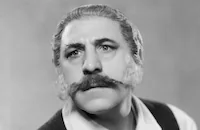Two Heads on a Pillow

Brief Synopsis
Cast & Crew
William Nigh
Neil Hamilton
Miriam Jordan
Henry Armetta
Hardie Albright
Dorothy Appleby
Film Details
Technical Specs

Synopsis
Pushed by her meddling, snobbish mother, Mrs. Van Suydam, Evelyn Smith decides to end her stormy one-month marriage and divorce her husband Jack, a struggling lawyer. Seven years later, Jack and his legal partner, playboy Dave Talbot, are engaged by the Devonshires, a wealthy couple who are being sued by the working class Henry Populopulini. In hopes of settling the suit out of court, Jack invites Henry to meet with the Devonshires, whom Henry has accused of breaking up his son Anthony's marriage to their daughter Pamela, but during the confrontation, the stubborn Mrs. Devonshire becomes inflamed and leaves. Determined to mend matters, Jack calls Henry's lawyer for a meeting and is stunned when Evelyn walks through his door. Jack refuses to discuss Henry's case seriously, and Evelyn departs in a huff. Although Jack denies Dave's claim that he still loves Evelyn, he telephones her and, after apologizing, invites her to dinner. During the evening, Jack and Evelyn begin fighting over the case, which is subsequently sent to trial. A clever lawyer, Evelyn convinces the jury that Mrs. Devonshire was responsible for her daughter's annulment and wins a $100,000 verdict for Henry. Sure that Evelyn and Jack belong together, Judge Gorman, who presided at the trial, invites them for a round of bridge with Sam Walker and his wife. Gorman's hope of impressing Evelyn and Jack with the Walkers' "good" marriage explodes when the Walkers argue violently over a hand. Later that night, however, Jack, inspired by the Gormans' seemingly happy marriage, proposes to Evelyn, unaware that Mrs. Gorman has accused her husband of having an affair with Evelyn and is on her way to Reno. After Mr. Devonshire announces to Evelyn that he has defied his wife and, with Henry, has helped Anthony and Pamela to elope, Evelyn and Jack are invited to a spaghetti dinner at the Populopulinis'. During the dinner, the happy couple resorts to fighting again and drive into a raging rain storm, furious. After their car stalls in a ditch, Evelyn and Jack seek refuge at a farmhouse, where they pretend to be married. Following another verbal battle, the couple finally conclude that they must be in love after all.

Director
William Nigh
Cast

Neil Hamilton

Miriam Jordan

Henry Armetta

Hardie Albright
Dorothy Appleby
Mary Forbes

Edward Martindel
Claude King
Lona Andre
Betty Blythe

Edward Kane

Claire Mcdowell
George Lewis
Emily Fitzroy
Nellie V. Nichols
Dorothy Granger
Jilda Ford
Mary Foy
Jack Kennedy
Crew
Albert Demond
Rudolph Flothow
Neal Harbarger
Jimmie Higgins
M. H. Hoffman Jr.
M. H. Hoffman
Mildred Johnston
Frank Levitt
A. F. Meyer
Harry Neumann
Joe Novak
R. E. Tyler

Film Details
Technical Specs

Articles
Two Heads on a Pillow (1934)
Seven years later, Jack and Dave Talbot (Hardie Albright), his playboy law firm partner, are now defending the interests of a wealthy couple Mr. Devonshire (Claude King) and Mrs. Devonshire (Mary Forbes). Another meddling parent, Mrs. Devonshire has instigated the break-up of her daughter Pamela (Lona Andre)'s marriage to Anthony Populopulini (George Lewis) because she doesn't believe Anthony is her daughter's social equal. As a result the Devonshires are being sued by Anthony, who demands his in-laws pay him a sum of $100,000 for the enforced separation. Anthony's father Henry Populopulini (Henry Armetta) arrives at Dave and Jack's office to state his family's rationale for the lawsuit, but Mrs. Devonshire at least, is unmoved and unsympathetic. In a delicious coincidence, Evelyn, who since her divorce from Jack has gone back to school to become a lawyer, arrives at Jack's office to represent Henry Populopulini.
In a distinctly screwball turn, despite Jack's assertion that he no longer loves Evelyn, he invites his ex- to dinner. But more bickering ensues, and passions are even more inflamed when the Devonshire-Populopulini case goes to trial. A shrewd, agile lawyer, Evelyn wins a $100,000 judgment for Anthony against the Devonshires citing their responsibility for the annulment. The presiding Judge Gorman (Edward Martindel) guessing that Evelyn and Jack are still in love, invites them to his home for bridge. But the supposedly happy married couples at the bridge party are even more combative than Evelyn and Jack and hardly make a convincing case for marital harmony.
In the meantime Mr. Devonshire, with the help of Henry Populopulini, defies his wife in an effort to reunite Pamela and Anthony. That spirit of reconciliation proves infectious. Evelyn and Jack enjoy a celebratory dinner at the Populopulini home but before long they descend yet again into another round of bickering. Lost in the rain after dinner the couple take shelter at a country farmhouse where they are forced to masquerade as husband and wife. And that illusion appears to work its own magic, as the couple who began Two Heads on a Pillow married, then divorced, realize that they were happiest together after all.
Directed by William Nigh and originally titled Love Can't Wait, the comedy drama Two Heads on a Pillow adopts a slightly screwball concept and a common refrain, that meddling, snobbish mothers were the cause of the unhappy divorces between two sets of couples in the film. Prolific screenwriter and director George Waggner was originally intended to pen the script but longtime Republic Studios writer Albert DeMond is credited with the screenplay. The screenplay was adapted from a short story called The Eternal Masculine by Dorothy Canfield, an educational reformer and social activist who was named one of the 10 most influential women in the United States by Eleanor Roosevelt. Children's book author Canfield (Understood Betsy) had previously written a 1924 novel The Home Maker with a remarkably modern plotline. Over the course of the novel a deeply unhappy housewife is thrust out into the work force as a saleswoman when her husband suffers a devastating injury that leaves him confined to a wheelchair. The novel was considered ahead of its time for imagining a gender role reversal in which both husband and wife are far happier in their newfound roles as a stay-at-home-father and a female breadwinner.
Director: William Nigh
Producer: M.H. Hoffman
Screenplay: Albert DeMond, from a short story by Dorothy Canfield
Cinematography: Harry Neumann
Production Design: Rudolph C. Flothow
Music: Hugo Riesenfeld
Cast: Neil Hamilton (Jack Smith), Miriam Jordan (Evelyn Smith/Evelyn Adams), Henry Armetta (Henry Populopulini), Hardie Albright (Dave Talbot), Dorothy Appleby (Mitzie LaVerne), Mary Forbes (Mrs. Devonshire), Edward Martindel (Judge Gorman), Claude King (Albert Devonshire), Lona Andre (Pamela Devonshire), Betty Blythe (Mrs. Walker), Emily Fitzroy (Mrs. Van Suydam), George J. Lewis (Anthony Populopulini).
BW-68m.
by Felicia Feaster

Two Heads on a Pillow (1934)
Quotes
Trivia
Notes
The title of the viewed print, which included no credits, was Love Can't Wait. According to the 1934 Film Daily Product Guide, George Waggner was to be the screenwriter on this film.














